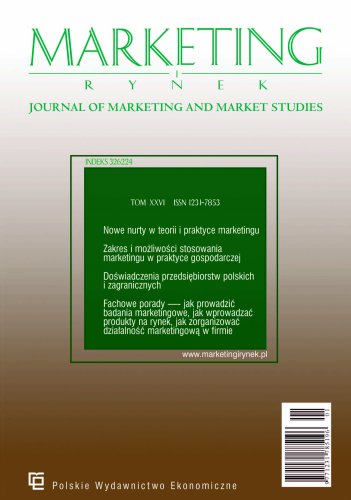Key competences of changing organizations — new challenges on the labour market
The article is synthesizing and conceptual. The aim of it is to identify the key competences of the organization, whichin the conditions of permanent change determine its survival and development. Competencies are understood as the key abilities and skills of an organization based on its resources. The author attempts to confirm the thesis that there are currently three fundamental competences resulting from the requirements set by the environment. The first is the ability to manage generational diversity as a response to demographic challenges. The second competence is the ability to manage relationships with employees by building their commitment and loyalty. This competence is the organization's response to the processes taking place on the Polish labour market. The third competence is the ability to manage employee competencies in the era of the technological revolution known as 4.0.
References
Bibliografia/References
Ashton, K. (2009). That 'internet of things' thing. RFiD Journal, 7(22), 97–114.
Badurek, J. (2014), Systemy ERP dla wytwórczości nowej generacji. Przedsiębiorstwo we współczesnej gospodarce — teoria i praktyka, (2), 79–90.
Biggs, S. A. i Lowenstein, A. (2011). Generational Intelligence. A critical Approach to Age Relations. London i New York: Routledge.
Draganidis, F. i Mentzas, G. (2006), Competency based management: a review of systems and approaches. Information Management & Computer Security,
14(1), 51–64.
Drath, R. i Horch, A. (2014). Industrie 4.0: Hit or Hype? Industrial Electronics Magazine, 8(2), 56–58.
Enke, J. i in. (2018). Industrie 4.0 — Competencies for a modern production system. A curriculum for Learning Factories. Procedia Manufacturing, (23), 267–272.
Gartner Inc. (2013). Forecast: The Internet of Things. Worldwide. http://www.gartner.com
Gierszewska, G. i Romanowska, M. (1997). Analiza strategiczna przedsiębiorstwa. Warszawa: Polskie Wydawnictwo Ekonomiczne.
Glas, A. H. i Kleemann, F. C. (2016). The Impact of Industry 4.0 on Procurement and Supply Management: A Conceptual and Qualitative Analysis.
International Journal of Business and Management Invention, 5(6), 55–66.
Gołębiowska, E. (2014). Zarządzanie dobrostanem społecznym w dobie zmian demograficznych. Przedsiębiorczość i Zarządzanie, XV(11), 32–43.
Gracel, J., Stoch, M. i Biegańska, A. (2017). Inżynierowie Przemysłu 4.0. (Nie) gotowi do zmian? Kraków: ASTOR.
Grant, R. M. (2002). Contemporary Strategic Analysis. Oxford: Blackwell.
Klett, F. (2010). The Design of a Sustainable Competency-Based Human, Resources Management: A Holistic Approach. Knowledge Management & E-Learning: An International Journal, 2(3), 278–292.
Liwiński, J. i Sztanderska, U. (2010). Wstępne standardy zarządzania wiekiem w przedsiębiorstwach. Warszawa: Polska Agencja Rozwoju Przedsiębiorczości.
Łapuńka, I. i Marek-Kołodziej, K. (2017). Zarządzanie 3.0 w Przemyśle 4.0.
Przedsiębiorczość i Zarządzanie, XVIII(10), 23–36.
Moczydłowska, J. M. (2008). Zarządzanie kompetencjami zawodowymi a motywowanie pracowników. Warszawa: Difin.
Moczydłowska, J. M. (2013a). Zaangażowanie pracowników — aspekty psychologiczne i organizacyjne. Myśl Ekonomiczna i Polityczna, 4(42), 162–171.
Moczydłowska, J. M. (2013b). Zarządzanie relacjami z pracownikami (ZRzP) — nowe spojrzenie na relacje organizacji z pracownikami. Przedsiębiorczość i Zarządzanie, XIV(12), 33–42.
Moczydłowska, J. M. i Kowalewski, K. (2014). Nowe koncepcje zarządzania ludźmi. Warszawa: Difin.
Parkinson, B. i Colman, A. (1999). Emocje i motywacja. Poznań: Wydawnictwo Zysk i S-ka.
Prifti, L., Knigge, M., Kienegger, H. i Krcmar, H. (2017). A Competency Model for "Industrie 4.0" Employees. W: Leimeister, J. M.; Brenner, W. (Hrsg.): Proceedings der 13. Internationalen Tagung Wirtschaftsinformatik (WI 2017), St. Gallen, 46–60.
Schimanek, T. (2010). Społeczne uwarunkowania i konsekwencje niskiej aktywności zawodowej osób 50+ oraz rozwiązania służące jej zwiększaniu. W: T. Schimanek (red.), Zarządzanie wiekiem i nie tylko. Warszawa: Akademia Rozwoju Filantropii w Polsce.
Schmidt, R. (2013). Industrie 4.0 — revolution oder evolution. Wirtsch. Ostwürtt, (4–5), 23–33.
Schmidt, R. i in. (2015). Industry 4.0 — Potentials for Creating Smart Products: Empirical Research Results. Business Information System, June, 16–27.
Soldaty, A. (2017). Czwarta rewolucja przemysłowa i Przemysł 4.0. Control Engineering Polska, (9).
Soldaty, A. (red.). (2016). Koncepcja Centrów Kompetencji Industry 4.0 wspierających transformację krajowego przemysłu wytwórczego. Warszawa. Pozyskano z: www.mr.gov.pl

